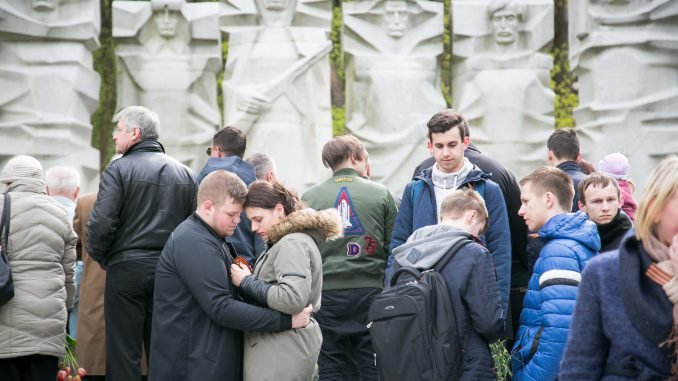
The police say that up to 1,000 people, most of them wearing the orange-and-black St. George ribbons, attended the ceremony. To the sound of military marches, people laid red carnations and wreaths at the memorial to the victims of the war.
Among those present were Russia’s ambassador Alexander Udaltsov and Belarus’ ambassador Alexander Korol, as well as members of political parties representing ethnic minorities in Lithuania.
Udaltsov said, “We and you cannot help but notice that there is a considerable number of people today who want to rattle weapons and force us to do something we will never do, to make us change our minds about what we experienced in World War Two.”
“Therefore, we need, so to speak, to keep our gunpowder dry and fight for peace,” he told the crowd.
Korol said that his grandfather and other members of the family had perished in the war.
“We need to remember what happened and to see present-day events in the right light,” the ambassador said as he congratulated World War Two veterans.
Residents of the street leading to the cemetery put up three NATO flags in protest of the commemoration.
“All of my grandfathers and grandmothers participated in the war. It is important for me. It is Victory Day today. My grandfather went as far as Berlin; he survived the war. West is West and we are we. Let them mark what they want to. We will mark May 9. Everybody has their traditions,” Jelena, who attended the event, told BNS.
She said that the NATO flags did not overshadow the commemoration.
A man in his late 20s, who did not give his name, said that he and his friends marked “the victory over the fascism” every year.
“We need to remember the feat. I we do not celebrate it, we will forget it over time. I hope our children will celebrate it, too. Yes, many people do not like to see these symbols after the Ukraine events, but they (the symbols) emerged well before that,” he said.
The police said that no incidents involving Soviet symbols banned by law in Lithuania or any other incidents had been reported.
Lithuania, like many other European countries, marks the end of World War Two on May 8.
The celebration of the Soviet victory on May 9 is a controversial issue in Lithuania, which remained occupied by the Soviet Union after the war ended and experienced repressions, mass deportations to Siberia and forced collectivization in subsequent years.

Be the first to comment